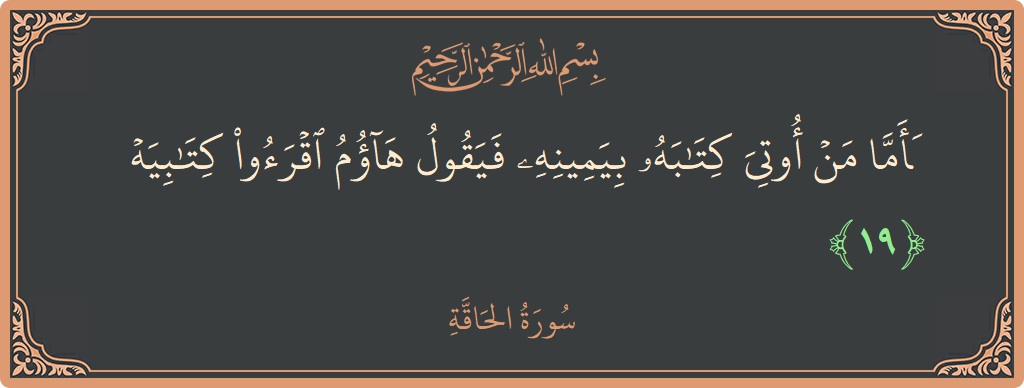Surah Al-Haaqqa: Verse 19 - فأما من أوتي كتابه بيمينه... - English
Tafsir of Verse 19, Surah Al-Haaqqa
English Translation
So as for he who is given his record in his right hand, he will say, "Here, read my record!English Transliteration
Faamma man ootiya kitabahu biyameenihi fayaqoolu haomu iqraoo kitabiyahTafsir of Verse 19
هَاؤُمُ اقْرَءُوا كِتَابِيَهْ (Come here, read my book… 69:19). The word ha'umu, literally means, "come" but, idiomatically, it is used in the sense of the plural imperative verb khudhu "take'. In other words, one who is given his record book in his right hand, he will be elated and, looking at the people around him, will say 'Here, take my account book and read it!'
The Happiness of the Person Who will receive His Book in His Right Hand and His Good Situation
Allah informs of the happiness of those who receive their Book in the right hand on the Day of Judgement and being pleased with this. Out of his extreme pleasure is his saying to everyone that he meets,
(Here! read my Record!) meaning, `take my Book and read it.' He will say this because he knows that what is in it is good and purely virtuous deeds. He will be of those whom Allah replaced their bad deeds (evils) with good deeds. `Abdur-Rahman bin Zayd said, "The meaning of
(Here! read my Record!) is `Here, read my Book.'... The suffix `Um' is a grammatical addition." This is what he (`Abdur-Rahman) said. It seems apparent that the suffix `Um' means here `you all.' Ibn Abi Hatim recorded that `Abdullah bin `Abdullah bin Hanzalah - and he (Hanzalah) was the Companion who was washed by the angels for his funeral - said, "Verily, Allah will stop His servant on the Day of Judgement and He will make his sins appear on the outside of his Book of Records. Then He will say to him, `Did you do this' The servant will respond, `Yes my Lord.' Then Allah will say to him, `I will not expose you (or dishonor you) for it, for verily, I have forgiven you. ' The person will then say, `Here (you all) read my Book!"'
(Surely, I did believe that I shall meet my account!) This will be when he (the servant of Allah) will be saved from being disgraced and exposed on the Day of Judgement. In the Sahih, it is recorded from Ibn `Umar that he was asked about the private counsel. He responded by saying that he heard the Messenger of Allah saying,
(Allah will bring the servant close (to Him) on the Day of Judgement and make him confess all of his sins. This will continue until the servant thinks that he is about to be destroyed. Then Allah will say, "Verily, I have concealed these sins for you in the worldly life and I have forgiven you for them today." Then he will be given his Book of good deeds in his right hand. However, about the disbeliever and the hypocrite, the witnesses will say, ("These are those who lied on their Lord, and verily, the curse of Allah is on the wrongdoers.")) Allah's statement,
(Surely, I did believe that I shall meet my account!) means, `I used to be certain in the worldly life that this day would definitely come.' This is as Allah says,
((They are those) who are certain that they are going to meet their Lord.) (2:46) Allah then says,
(So he shall be in a life, well-pleasing.) (69:21) meaning, pleasant.
(In a lofty Paradise,) meaning, having elevated castles, beautiful wide-eyed maidens, pleasant stations and eternal joy. It has been confirmed in the Sahih that the Prophet said,
(Verily, Paradise has one hundred levels and between each level is a distance like the distance between the earth and the sky.) Then Allah says,
(The fruits in bunches whereof will be low and near at hand.) Al-Bara' bin `Azib said, "This means close enough for one of them (the people of Paradise) to reach them while he is lying on his bed." More than one person has said this. Then Allah says,
(Eat and drink at ease for that which you have sent on before you in days past!) meaning, this will be said to them as an invitation to them of blessing, favor and goodness. For verily, it has been confirmed in the Sahih that the Messenger of Allah said,
(Work deeds, strive, seek to draw near (to Allah) and know that none of you will be admited into Paradise because of his deeds.) They (the Companions) said, "Not even you O Messenger of Allah" He replied,
(Not even me, except if Allah covers me with mercy from Himself and grace. )
